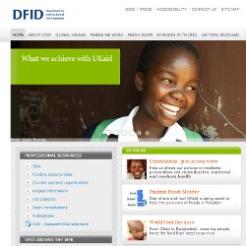The Department for International Development (DfID) must help foundations to improve transparency and pre-empt legal enforcement of reporting, according to a parliamentary report on DfID’s relationship with foundations.
The report by the International Development Committee (IDC) highlights the areas of success, and where improvement is necessary for DfID in its relationship with private foundations. It said that compared to traditional donors, foundation reporting was weak, and that a US approach, where foundations are required to list every grant made, and pay out 5 per cent of the value of their endowment each year for charitable purpose, could be on the cards.
“Improved transparency amongst foundations would help pre-empt the need to move to this kind of mandatory regulation in the UK,” said the Committee, calling on DfID to encourage foundations to sign up to its International Aid Transparency Initiative, a voluntary reporting system currently used by just a few foundations, including the Hewlett Foundation.
The idea of a mandatory 5 per cent annual giving output for foundations was mooted in 2009 in a Cass Business School report which argued that a formal distribution quota could increase the charitable funding of endowed foundations by 31.5 per cent or around £1bn per annum.
But the foundation sector strongly opposed the idea and it never gained traction.
Limited information is available on the impact of foundations, but research released last November showed that family foundations had outpaced the growth of both corporate and individual giving, with the total value of donations by the top 100 family foundations increasing by 27 per cent in the five years previous. These foundations gave £1.3bn in 2009/10, which accounted for 7 per cent of all giving in that year.
Need to engage more with smaller foundations
The IDC report also highlights a need for DfID to engage more with smaller foundations, advising that it found smaller charities received a less open line of communication than larger foundations, which are appointed a named contact. DfID’s relationship with foundations was found to be “somewhat ad hoc”, with larger foundations such as the Gates Foundation interacting directly on a weekly basis, while smaller charities reported finding it difficult to have any kind of regular contact with the Department.
As a result of the Committee raising these concerns, the Secretary of State for International Development Andrew Mitchell has agreed to host an annual meeting of smaller foundations. DfID recommends that this is increased to a bi-annually or quarterly meeting instead, and that the Department offers a named contact for every foundation.
A better funding relationship between DfID and foundations could be developed, the Committee found, advising that foundations could be useful in relieving the burden of distributing smaller funding packages. The recommendation was in response to a series of foundations advising that there were not enough opportunities for collaboration of this kind.
Foundations in developing countries
Greater collaboration with foundations based in developing countries was also identified as a necessity going forward. “We recommend that, as part of its wider efforts to improve aid effectiveness, DfID ensures that its country offices and assist partner governments co-ordinate foundations and philanthropists seeking opportunities in the country.
"Further, DfID is only in the early stages of engaging with developing country-based foundations. We suggest it increases its engagement in order to form partnerships with these important new philanthropic actors.”








